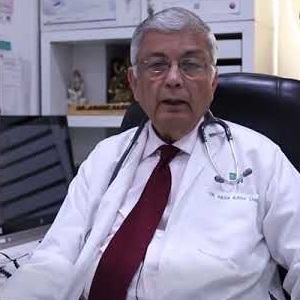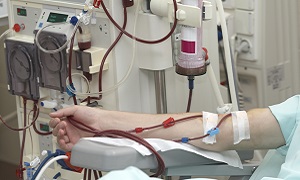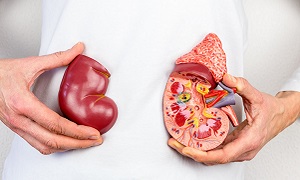Best Doctors in India for Glomerulonephritis Treatment
- Nephrologist, Gurugram, India
- Over 25 years’ experience
Profile Highlights:
- Dr. Lakshmi Kant Tripathi throughout his career has supervised around 54000 hemodialyses at different centers in Delhi NCR, with great clinical outcomes.
- He is successfully engaged in kidney transplantations, including Incompatible & High-risk ones. He is a specialist in managing Resistant hypertension, difficult-to-treat Nephrotic Syndromes, Complicated UTIs & high-risk Transplants.
- Nephrologist, Gurugram, India
- Over 40 years’ experience
Profile Highlights:
- Dr. Manju Aggarwal is one of the leading nephrologists in India and has many years of experience in Nephrology at some of the best medical institutions including the University of Minnesota.
- She has expertise in treating critically ill patients with acute and chronic renal failure and those on dialysis and renal transplant.
- Dr. Aggarwal is also experienced in managing difficult and high-risk renal transplants, especially for those who need desensitization.
- Nephrologist, New Delhi, India
- Over 22 years’ experience
Profile Highlights:
- With over 22 years of experience, Dr. Saurabh Pokhriyal is currently associated with Manipal Hospitals in Dwarka, Delhi. Known for his skill in Nephrology and Renal Transplant Medicine, Dr. Saurabh Pokhriyal has a distinct fascination with complex cases of nephrology as well as in performing ABO-contrary transplants.
- He has worked additionally for the Primary treatment of Glomerular Diseases. Dr. Pokhriyal has also authored several articles that have been distributed in different national as well as international chapters and books.
- Nephrologist, New Delhi, India
- Over 45 years’ experience
Profile Highlights:
- Dr. Ashok Sarin is a specialist in Kidney Diseases, Dialysis, and Transplantation. He is currently working at Indraprastha Apollo Hospital, Sarita Vihar, New Delhi.
- After receiving his education at the All India Institute of Medical Sciences, New Delhi, Dr. Ashok Sarin proceeded to Northern Ireland U.K. where he received training under Dr. Mary Mcgeown at the prestigious Belfast City and Royal Victoria Hospital Queens University of Belfast U.K. He is known to receive World Class Training in treating all types of Kidney Diseases, Hemodialysis, CAPD, and Live and Cadaver Kidney Transplantation.
- He is a member of several associations such as the Indian Society of Nephrology, Delhi Nephrology Society, North Zone Society of India, as well as the Association of Physicians of India. He is also the President of the Delhi Nephrology Society.
- Nephrologist, Gurugram, India
- Over 18 years’ experience
Profile Highlights:
- Currently working as Associate Director, Nephrology at Medanta, Gurugram; Dr. Jha has several years of rich experience in his field.
- His area of expertise is renal transplantation, hemodialysis, chronic kidney diseases, and acute kidney injury. Throughout his career, he has treated thousands of patients from all over the country and also provides his patients with the best medical care.
- Dr. Jha completed DNB Nephrology from Manipal Hospital; Bengaluru in 2011. He has wide experience in pre as well as post-transplant care.
- Nephrologist, New Delhi, India
- Over 30 years’ experience
Profile Highlights:
- Dr. Alka Bhasin is a General Physician as well as a Nephrologist and a Renal Specialist, based in Saket, New Delhi. She completed her Fellowship in Nephrology from Thomas Jefferson University Hospital in 2000.
- Some of the services provided by Dr. Alka Bhasin include Hemodiafiltration (HDF), Kidney Transplant, Renal Angioplasty & Stenting, Laparoscopic Nephrectomy, Hemodialysis, etc.
- Nephrologist, Chennai, India
- Over 14 years’ experience
Profile Highlights:
- Dr. Jagdish K is currently designated as the Senior Consultant of Nephrology with a vast experience of 14 years.
- Dr. Jagdish K is well versed in Temporary Haemodialysis Catheters, Bone Marrow Aspiration and Biopsy, Lumbar Puncture, Arterial Lines, and Renal Biopsy.
- His special interests lie in Glomerulonephritis, Extracorporeal treatments, Post-Transplant Infections, and Renal Transplants across blood groups and in highly sensitized individuals.
- Nephrologist, New Delhi, India
- Over 20 years’ experience
Profile Highlights:
- Dr. Rahul Grover is known to be one of the finest renal doctors and nephrologists in New Delhi. He offers excellent care to all his patients.
- He holds an experience of several years and has extensive knowledge in the field of medicine.
- He is also an esteemed member of the Indian Society of Nephrology (ISN), and the Indian Society of Organ Transplantation (ISOT), and this further adds to his credibility.
- Nephrologist, Gurugram, India
- Over 15 years’ experience
Profile Highlights:
- Known as one of the best nephrologists in the NCR region, Dr. Manish Jain holds a special interest in renal transplants as well as clinical nephrology.
- His compassionate patient care and lifestyle advocacy have helped patients recover from various disorders.
- Throughout his career, Dr. Manish Jain has published several papers in India and is also a member of several medical associations.
- Nephrologist, Gurugram, India
- Over 31 years’ experience
Profile Highlights:
- Dr. Vijay Kher is a well-known nephrologist with over 31 years of experience. He did his MBBS from Glancy Medical College, Amritsar. He completed his DNB – General Medicine from the Postgraduate Institute of Medical Education and Research, Chandigarh in 1977.
- Some of the services provided by Dr. Kher are ABO Incompatible Transplantation, Steroid Free Immunosuppression, Clinical Immunosuppression, Kidney Disease Treatment Acute Renal Failure, etc.
Best Hospitals in India for Glomerulonephritis Treatment
Fortis Hiranandani Hospital, Mumbai
- City: Mumbai, India
Hospital Highlights:
- Fortis Hiranandani hospital was established in 2007.
- The hospital is an advanced tertiary care, multi-specialty hospital equipped with 149 beds.
- The hospital is equipped with a super ICU to provide emergency medical care to critically ill patients.
- The hospital is NABH accredited.
- The critical care facility in the hospital is augmented with the state-of-the-art facilities that facilitate speedier diagnosis and efficient monitoring.
- The hospital provides specialty medical services in cardiology, orthopedic science, pediatric science, neurology, diabetic care, urology, nephrology, ENT, obstetrics, gynecology, cosmetic surgery, bariatric surgery, neuro and spine care.
Fortis Hospital, Anandpur, Kolkata
- City: Kolkata, India
Hospital Highlights:
- Fortis Hospital, Anandapur, Kolkata is a world-class super-speciality equipped with the latest technologies in the medical world.
- The hospital is NABH accredited.
- This state-of-the-art facility specializes in cardiology and cardiac surgery, urology, nephrology, neurosciences, orthopaedics, digestive care, emergency care and critical care.
- The hospital, governed by integrated Building Management System (IBMS), has a pneumatic chute system, for quick vertical and horizontal transportation between floors, facilitating speedy transfer of patient specimens, documents, reports, and medicines to the concerned departments.
- The hospital also has a nephrology department with over 28 advanced dialysis units.
Fortis Hospital Banerghatta, Bengaluru
- City: Bengaluru, India
Hospital Highlights:
- Fortis Hospital Bannerghatta, Bengaluru was established in 2006.
- The hospital is a 276 bedded multi-specialty tertiary care facility.
- The hospital specializes in cutting-edge medical technology and dedicated patient care services.
- The hospital is equipped with state-of-the-art technologies like trans-radial angioplasty, trans-abdominal cardiac surgery, and computerized TKR navigation surgery.
- The hospital provides specialty medical services in cardiology, cardiac surgery, orthopedics, neurology, neuro-surgery, GI, and Minimal Access Surgery (MAS).
Fortis Hospital, Malar, Chennai
- City: Chennai, India
Hospital Highlights:
- Fortis Malar was established in 1992 and was formerly known as Malar Hospital.
- The hospital specializes in cutting-edge medical technology and dedicated patient care services.
- The hospital is multi-specialty, tertiary care facility with 180 beds.
- The hospital offers comprehensive medical care in specialties such as cardiology, cardio-thoracic surgery, neurology, neurosurgery, orthopedics, nephrology, gynecology, gastroenterology, urology, pediatrics, and diabetes.
Gleneagles Global Hospital, Parel, Mumbai
- City: Mumbai, India
Hospital Highlights:
- Gleneagles Global Hospital The 450-bed facility comprises of 17-stories, housing state-of-the-art infrastructure, and advanced medical care facilities.
- The hospital offers end-to-end clinical, surgical, and diagnostic services. It is equipped with a team of eminent medical professionals aided by qualified nurses and medical staff
- The Hospital offers advanced Endoscopic procedures, Hepatobiliary and Liver Surgeries, Surgical and Medical Gastroenterology, Bariatric Surgery, and Robotic surgery.
- The hospital is a center of excellence for Orthopedics, Joint Replacement, Knee Replacement, and Hip Replacement surgery.
Manipal Hospital, Dwarka, Delhi
- City: New Delhi, India
Hospital Highlights:
- Manipal Hospitals, Dwarka, is a super-specialty hospital in Dwarka, New Delhi, which is a part of Manipal Hospitals Group.
- The hospital aims to provide the best treatment on par with international standards at a fraction of the cost.
- Equipped with 380 beds, the hospital is also one of the new age hospitals which are equipped fully with state-of-the-art infrastructure, cutting-edge technology as well as the latest and advanced clinical practices. The hospital also has 13 modular Operation theatres with 118 beds which are solely meant for critical care.
- The hospital comprises internationally acclaimed doctors and highly professional and experienced hospital and medical staff who are able to provide preventive, therapeutic, and diagnostic services all under one roof.
Paras Hospital, Gurugram
- City: Gurugram, India
Hospital Highlights:
- Paras hospital was established in 2006 and is the 250 bedded flagship hospital of Paras Healthcare.
- The is supported by a team of doctors of international and national repute.
- The hospital is NABH accredited and also the first hospital in the region to have a NABL accredited laboratory.
- The hospital provides specialty medical services in around 55 departments including Neurosciences, Joint Replacement, Mother & Child Care, Minimal Invasive Surgery, Gynecology and Obstetrics, Ophthalmology, Dermatology, Endocrinology, Rheumatology, Cosmetic and Plastic surgery.
- The hospital is equipped with state-of-the-art technologies.
S L Raheja Hospital, Mahim, Mumbai
- City: Mumbai, India
Hospital Highlights:
- SL Raheja hospital is a 140-bed multi-specialty tertiary care hospital that is being managed by Fortis Healthcare Ltd.
- The hospital is a benchmark in healthcare and medical facilities in the neighborhood of Mahim & the western suburbs.
- L.Raheja Hospital, Mahim has one of the most effective ICU and Casualty care services.
- The hospital provides specialty medical services in Cardiology, Oncology, Neurology, Orthopedics, Mother & Child Care, and in Diabetes.
Wockhardt Hospitals, Mumbai
- City: Mumbai, India
Hospital Highlights:
- Wockhardt Hospitals were established in the year 1973, originally called First Hospitals and Heart Institute.
- Wockhardt Hospitals are super specialty health care networks in India, nurtured by Wockhardt Ltd, India’s 5th largest Pharmaceutical and Healthcare company.
- Wockhardt Hospitals is associated with Partners Harvard Medical International, an international arm of Harvard Medical School, USA.
- Wockhardt Heart Hospital performed India’s first endoscopic heart surgery.
- The hospital has a state-of-the-art infrastructure equipped with the latest technologies and modern equipment.
- It has special Centers of Excellence dedicated to the major specialties to provide hassle-free and high-quality clinical care.
Pushpawati Singhania Hospital & Research Institute, New Delhi
- City: New Delhi, India
Hospital Highlights:
- Established in 1996, Pushpawati Singhania Research Institute is one of the top hospitals in the NCR region, as well as one of the top facilities in India for gastroenterology. The hospital is one of South Asia’s first institutes in medical and surgical treatment for diseases related to digestion.
- The hospital is equipped with state-of-the art facilities coupled with the latest equipment as well as renowned consultants from various parts of India as well as other parts of the world.
Glomerulonephritis
Glomerulonephritis is a condition where the tiny filters in your kidneys, i.e. glomeruli, get inflamed. Glomeruli help you to remove excess fluid and waste from your bloodstream, which is then passed into your urine. This condition can come on suddenly or develop gradually. Both types may be fatal.
Glomerulonephritis can occur on its own or sometimes it may be a complication of another disease such as diabetes or lupus. Your kidneys can get damaged if there is severe or prolonged inflammation caused by glomerulonephritis. Therefore, early diagnosis and treatments are quite important.
Symptoms
Symptoms that you experience usually depend on what type of glomerulonephritis you are having and the severity of the condition.
Symptoms of acute glomerulonephritis include the following:
- Puffiness in your face
- Extra fluid in your lungs, which can lead to coughing
- Urinating less often
- Blood in your urine
- High Blood Pressure
The chronic form of glomerulonephritis can sometimes occur without any symptoms. There might be slow development of symptoms that are similar to the acute form. Some of the symptoms include the following:
- Blood or excess protein in your urine, which may be microscopic and show up in urine tests
- High blood pressure
- Pain in the abdomen
- Frequent nosebleeds
- Swelling in your ankles and face
- Frequent nighttime urination
- Bubbly or foamy urine, caused by excess protein
In some cases, your glomerulonephritis might get so advanced that it can lead you to develop kidney failure. Some of the symptoms of this can include the following:
- Fatigue
- Lack of appetite
- Nausea and vomiting
- Insomnia
- Muscle cramps at night
- Dry and itchy skin
Causes
Several conditions can lead to glomerulonephritis. The disease is also sometimes known to run in families. In other cases, the disease may be unknown.
The following causes can lead to inflammation of the glomeruli:
Post-streptococcal glomerulonephritis- Glomerulonephritis can develop some days after you recover from a strep throat infection or, in rare cases, a skin infection. To combat the infection, your body is going to produce extra antibodies that may eventually settle in the glomeruli, and lead to inflammation.
This type of glomerulonephritis is more common among children than adults. But they are also likely to recover more quickly.
Bacterial endocarditis- Bacteria can spread occasionally through the bloodstream and lodge in your heart, leading to an infection of one or more of your heart valves. If you have a heart defect, such as a damaged or artificial heart valve, then you are at a greater risk. Bacterial endocarditis is associated with glomerular disease, though the connection between the two is still unclear.
Viral infections- There are several viral infections, such as the human immunodeficiency virus (HIV), hepatitis B, and hepatitis C, which can also cause glomerulonephritis.
Goodpasture’s syndrome- This is a rare immunological lung disorder that is similar to pneumonia. Goodpasture’s syndrome leads to bleeding in your lungs as well as glomerulonephritis.
Lupus- This is a chronic inflammatory disease, which can affect many parts of your body, such as your joints, skin, blood cells, heart, kidneys, and lungs.
IgA nephropathy- This condition is characterized by recurrent episodes of blood in the urine. This primary glomerular disease is a result of deposits of immunoglobulin A (IgA) in the glomeruli. IgA nephropathy can progress for years without any noticeable symptoms.
Polyarteritis- This is a form of vasculitis which affects small and medium blood vessels in several parts of your body, like your heart, kidneys, and intestines.
Granulomatosis with polyangiitis- This form of vasculitis, which is formerly known as Wegener’s granulomatosis, can affect small and medium blood vessels in your lungs, upper airways, and kidneys.
High blood pressure- High blood pressure can damage your kidneys and impair their ability to function normally. Glomerulonephritis can also lead to high blood pressure since it reduces kidney function and can also influence how your kidneys handle sodium.
Diabetic kidney disease (diabetic nephropathy)- This can affect anyone having diabetes, generally taking years to develop. Good control of blood sugar levels and blood pressure can however prevent or slow kidney damage.
Focal segmental glomerulosclerosis- This condition is characterized by scattered scarring of some of the glomeruli, and it can result from another disease or sometimes occur for no known reason.
Infrequently, chronic glomerulonephritis also runs in families. One inherited form, Alport syndrome, may impair one’s vision or hearing.
Glomerulonephritis is associated with certain cancers as well, such as multiple myeloma, lung cancer as well as chronic lymphocytic leukemia.
Diagnosis
Glomerulonephritis is often detected during a routine urine analysis. Tests to assess your kidney function and for diagnosis of glomerulonephritis can include:
Blood tests
Urine test
Imaging tests
If your doctor detects evidence of damage, he/she can recommend a kidney X-ray, a CT scan, or an ultrasound exam.
Kidney biopsy
Treatment
Treatment is going to depend on several factors such as whether the condition is acute or chronic, the underlying cause, as well as the severity of the symptoms.
Medication
Glomerulonephritis after a strep infection should generally clear up without any treatment, though your doctor might prescribe antibiotics to kill the pathogens that are causing the infections. However, the patient will also likely need to reduce the intake of fluids as well as avoid food and drinks containing alcohol or high levels of protein, potassium, or salt.
Dialysis
Kidney transplant
A kidney transplant can be possible if the individual is healthy. However, for people who cannot undergo a transplant, dialysis is the only option.
Complications
Glomerulonephritis can cause severe damage to your kidneys, making them lose their filtering ability. Some of the possible complications of glomerulonephritis include:
High blood pressure- Damage to your kidneys and the resulting buildup of wastes in your bloodstream may eventually cause your blood pressure to rise.
Acute kidney failure– Loss of function in the filtering part of the nephron can lead to rapid accumulation of waste products. Due to this, you might require emergency dialysis, which is an artificial means of removing extra fluids and waste from your blood, using an artificial kidney machine.
Chronic kidney disease– In this condition, your kidneys lose their filtering ability. Kidney function that deteriorates to below ten percent of normal capacity results in end-stage kidney disease, which can require dialysis or a kidney transplant to help sustain life.
Nephrotic syndrome- With this syndrome, too much protein in your urine causes too little protein in your blood. Nephrotic syndrome may be associated with high blood cholesterol as well as swelling of your eyelids, feet as well as the abdomen.
Prevention
Although most forms of glomerulonephritis are not preventable, there are some ways to reduce the risk.
Some of the ways include the following:
- Seek medical attention if you have a strep infection causing a sore throat or impetigo
- Practice safe sex
- If you have blood pressure or diabetes, keep it in control
- Avoid the use of illegal intravenous drug as well as sharing needles
A healthy lifestyle with proper exercise, proper sleep, and a balanced diet can also help in reducing the risk of glomerulonephritis.



























